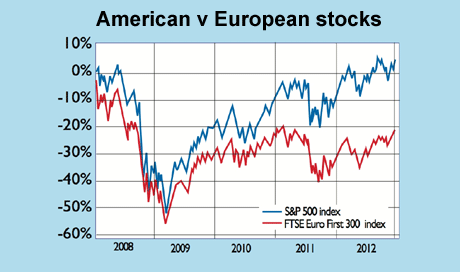Get the latest financial news, insights and expert analysis from our award-winning MoneyWeek team, to help you understand what really matters when it comes to your finances.
You are now subscribed
Your newsletter sign-up was successful
Want to add more newsletters?

Twice daily
MoneyWeek
Get the latest financial news, insights and expert analysis from our award-winning MoneyWeek team, to help you understand what really matters when it comes to your finances.

Four times a week
Look After My Bills
Sign up to our free money-saving newsletter, filled with the latest news and expert advice to help you find the best tips and deals for managing your bills. Start saving today!
Equity markets kept up their New Year celebrations for four days. America's S&P 500 gained almost 5% last week. Britain's FTSE 100 reached an 18-month high. Pan-European stocks, as measured by the FTSE Eurofirst 300 index, have reached 22-month highs. Can they keep this up?
The optimism was due to the US government agreement over taxes and spending to avoid the fiscal cliff'. But as John Authers points out in the Financial Times, more stand-offs between Republicans and Democrats that could severely rattle markets are looming.
With Republicans threatening to force the US to default in order to secure spending cuts in February, "an event that really would be like falling off a cliff", the next drama is only weeks away. In Europe, the odds of a chaotic default and euro exit have fallen, but not been eliminated, as austerity grows ever more unpopular.
MoneyWeek
Subscribe to MoneyWeek today and get your first six magazine issues absolutely FREE

Sign up to Money Morning
Don't miss the latest investment and personal finances news, market analysis, plus money-saving tips with our free twice-daily newsletter
Don't miss the latest investment and personal finances news, market analysis, plus money-saving tips with our free twice-daily newsletter
The economic backdrop isn't much better than the political one. Central banks continue to print money, but spending cuts and tax increases are becoming a headwind for America's lacklustre recovery. Meanwhile, Europe, now in recession, will be lucky to produce "sluggish growth" by the end of the year. Japan has turned down and China has slowed too.

Global profits are expected to grow by 11% this year, but as Buttonwood points out in The Economist, "analysts are always optimistic in January, only to revise down their expectations later". Europe may be a better bet for earnings growth, or at least positive earnings surprises, however, as margins are at a 20-year average. In the US they are historically high.
Europe is also better placed when it comes to value. Cyclically adjusted price/earnings ratios are among the few relatively reliable predictors of long-term returns. As we have pointed out before, these are still at very reasonable single digit or low double-digit levels in Europe, compared to a historically pricey 21 in the US.
Europe remains "unloved and under-owned" and thus a better bet than the US, says Marcus Brookes of Cazenove Capital. Fundamentals suggest this is hardly likely to be a "bumper year" year for global equities, says Buttonwood. And recent signs of exuberance raise the threat of a setback. Nonetheless, European stocks remain a long-term buy.
Get the latest financial news, insights and expert analysis from our award-winning MoneyWeek team, to help you understand what really matters when it comes to your finances.
MoneyWeek is written by a team of experienced and award-winning journalists, plus expert columnists. As well as daily digital news and features, MoneyWeek also publishes a weekly magazine, covering investing and personal finance. From share tips, pensions, gold to practical investment tips - we provide a round-up to help you make money and keep it.
-
 Should you buy an active ETF?
Should you buy an active ETF?ETFs are often mischaracterised as passive products, but they can be a convenient way to add active management to your portfolio
-
 Power up your pension before 5 April – easy ways to save before the tax year end
Power up your pension before 5 April – easy ways to save before the tax year endWith the end of the tax year looming, pension savers currently have a window to review and maximise what’s going into their retirement funds – we look at how

